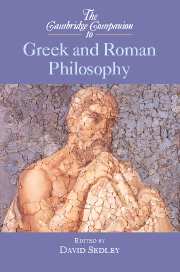Book contents
- Frontmatter
- Introduction
- 1 Argument in ancient philosophy
- 2 The Presocratics
- 3 The Sophists and Socrates
- 4 Plato
- 5 Aristotle
- 6 Hellenistic philosophy
- 7 Roman philosophy
- 8 Philosophy and literature
- 9 Late ancient philosophy
- 10 Philosophy and science
- 11 Philosophy and religion
- 12 The legacy of ancient philosophy
- Bibliography
- Glossary
- Index
12 - The legacy of ancient philosophy
Published online by Cambridge University Press: 28 May 2006
- Frontmatter
- Introduction
- 1 Argument in ancient philosophy
- 2 The Presocratics
- 3 The Sophists and Socrates
- 4 Plato
- 5 Aristotle
- 6 Hellenistic philosophy
- 7 Roman philosophy
- 8 Philosophy and literature
- 9 Late ancient philosophy
- 10 Philosophy and science
- 11 Philosophy and religion
- 12 The legacy of ancient philosophy
- Bibliography
- Glossary
- Index
Summary
Introduction
It has been claimed, with some justification, that the 'legacy of Greece to Western philosophy is Western philosophy'. The Greeks, after all, not only defined the main areas of philosophical inquiry – metaphysics, logic, epistemology, ethics and so on – but also formulated the questions which that inquiry has always sought to answer. Yet it was in the period from the twelfth to the seventeenth century that Greek thinkers, together with their Roman interpreters and followers, exerted the most profound influence on later philosophy. During this long epoch, extending from the late Middle Ages through the Renaissance and into the start of the early modern era, everything which survives today of ancient philosophy, with the exception of a few works, was recovered after the losses incurred in the aftermath of the Roman empire's collapse. Moreover, continuing the work of the Church Fathers, vigorous efforts were made, at different times and with varying degrees of success, to bring the major schools of pagan philosophy into line with Christianity. Once restored and reconciled with Christian theology, ancient philosophical traditions supplied the framework within which the philosophers operated and the foundation on which they built their own systems.
- Type
- Chapter
- Information
- The Cambridge Companion to Greek and Roman Philosophy , pp. 323 - 352Publisher: Cambridge University PressPrint publication year: 2003
- 2
- Cited by



